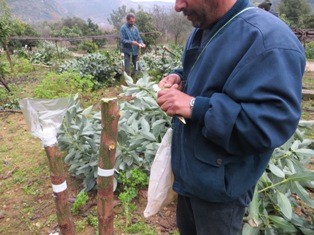
June 2014—Avocado producers in South Lebanon recently learned new grafting techniques for their trees, allowing them to upgrade their fruits to more marketable varieties of avocado, increase production and revenue, and improve the lives of their families.
Used within commercial horticulture, grafting unites two plants of the same species to increase and speed yield of hardier, more pest resistant fruit. Grafting also dwarfs the tree so fruit hangs lower on wider trees, making it easier to harvest.
The training was part of USAID’s Lebanon Industry Value Chain Development (LIVCD) program, which was launched in September 2012 to improve Lebanon’s economic stability and food security, particularly in rural areas; decrease migration to urban areas; and provide increased economic opportunities for women and youth. The five-year program injects expertise, new skills and low-cost technology into existing industries and sectors in Lebanon to create more jobs and increase incomes.
Rafik Boulos’ main source of income is his avocado orchard in Bisri. His orchard has provided him and his family a very modest income since most of his trees produce non-marketable fruits. Boulos, like many other avocado farmers, never had formal training and was not familiar with how to mix different varieties such as Hass and Pinkerton, which can fetch higher prices on the market.
Boulos and 18 other avocado farmers from Bisri, Jezzine and Caza attended the January 2014 LIVCD training to learn about different grafting techniques to convert their trees to more high-demand varieties. These techniques also help increase the survival rate of the graft and allow the trees to start producing in the coming season.
The participants immediately recognized the benefits of the USAID training: Just one week later, the farmers started converting 250 avocado trees into marketable varieties. While LIVCD specialists oversaw the initial procedure, the growers were able to complete the work themselves after the training.
“I immediately started applying these new grafting techniques, which are simple and inexpensive, and will greatly increase my productivity and revenues,” said Boulos. “I am now able to upgrade my orchard and, in less than one year, my trees will start producing high-quality fruits, which I will be able to sell at a better price.”
Several other avocado producers in Lebanon are now soliciting LIVCD’s technical assistance to upgrade their orchards and improve their livelihoods through grafting.
Links
Follow @USAIDMiddleEast, on Facebook







Comment
Make a general inquiry or suggest an improvement.